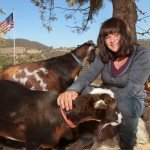
By Andrea Siedsma Special to the U-T 12:01 a.m.Sept. 30, 2013
Donna Buono
Hobbies: Fixing up her old farmhouse, taking care of her llama and goats, hiking and jet skiing.
Favorite quote: “Is there anything sadder than the foods of the 1950s? Canned, frozen, packaged concoctions, served up by the plateful, three meals per day, in an era in which the supermarket was king, the farmers market was, well, for farmers, and the word ‘locavore’ sounded vaguely like a mythical beast.” — Jeffrey Kluger
Career path: Although she took as many horticultural classes as she could, Buono ended up with a business administration degree from Saddleback College. “I was afraid I might end up working at a neighborhood nursery chain selling ornamentals. If you can’t eat it, I’ve never been interested.”
Subscription farm
Morning Song Farm is one of about a dozen Community Supported Agriculture farms in the county. The consumer buys a subscription from a farmer for a set price to receive fresh produce on a weekly or biweekly basis.
Cost: A small box is $34.50, weekly or biweekly; and a large box runs $44.50, weekly or biweekly.
Sample contents: Kale, royal purple beans, cucumbers, beets, passion fruit, pomegranates, green onions, parsley, basil, tomatoes and purslane.
Donna Buono –who learned many homesteading skills such as cheese making from her grandmother, an astrophysicist with NASA — has always had a desire for rural living. As a child, Buono and her family of five spent the summers camping on her uncle’s Maine farm in a 20-foot trailer, giving her the conviction that she’d rather live in a shack on acreage than a mansion in the suburbs.
Fast forward to now and you will find Buono on her 20-acre organic farm in the small town of Rainbow, in the northern part of San Diego County. What started out as a “hobby” in 2001 is now Morning Song Farm, which grows 70 different fruits, macadamias and heirloom vegetables.
The farm is a CSA (Community Supported Agriculture), and has drop-off points throughout San Diego and Orange counties for its customers to pick up weekly baskets. CSA is sometimes referred to as a “subscription farm” because the consumer buys a subscription from a farmer for a set price to receive fresh produce on a weekly or bi-weekly basis. Morning Song Farm is one of about a dozen CSAs in the county.
Morning Song Farm is known for its rare fruits and vegetables, such as mulberries, pineapple guavas, dragon fruit, and purslane, a leafy green high in omega-3. More than half of the farm is covered with 700 macadamia trees.
A recent weekly Morning Song Farm basket was packed with kale, royal purple beans, cucumbers, beets, passion fruit, pomegranates, green onions, parsley, basil, tomatoes and purslane. A small CSA box from Morning Song Farm costs $34.50, weekly or biweekly; and a large box runs $44.50, weekly or biweekly. A box of salad fixings goes for $19.75 a week. Morning Song Farm, which is mostly family-run, has one part-time and one full-time employee.
Buono, known as Farmer Donna, is a staunch food advocate, but will be the first to admit that passion aside, organic farming is a tough business. The Chula Vista native talked to U-T San Diego about the challenges and jubilations of owning and running a small organic farm.
Q: What was your motivation behind buying a farm?
A: My original vision was to grow passion fruit and fioja guavas, two underappreciated fruits that I really love. It was supposed to be a hobby. But I realized you can’t run something like this and make it just a hobby. As I started out at the Santa Monica farmers market, it became clear that two mostly out-of-season items on the table wouldn’t even pay the water bill. I wasn’t really thinking in terms of return on investment. I did follow my passion and have ended up doing something I love. In terms of ROI there are probably more lucrative industries to devote one’s life to, so for the young farmer just starting out, I would say that you need passion to get you through the rough times and the unprofitable years.
Q: Why did you choose to become a CSA?
A: I was doing farmers markets, and I love them, but economically it just didn’t pencil out for us. At the end of the day once you pay your employee and pay for gas, you don’t make anything. The CSA model turned out to be great for a mom like me. I didn’t have to work weekends at all anymore, which was life-changing.
With farmers markets, the farmer never knows how much to harvest; rain or a sporting event can change sales figures substantially. We gave or threw away a lot of food. With a CSA, you only harvest for the exact number of boxes you are preparing for your subscribers. We started the CSA with a single friend of mine who had admired the beautiful produce on my kitchen counter.
She and I shared in the cost to grow a vegetable garden, and we split the produce each week. Several other girlfriends joined in soon after, and we were off. Soon friends of friends asked to join.
Q: What are the challenges of marketing a CSA to consumers?
A: We don’t do a lot of marketing. We use Susco Media’s Zip Code Magazines to get the word out a little bit. We also advertise in the two local newspapers. For small farms like mine, getting the word out can be an issue.
Advertising is expensive. A majority of San Diegans who want non-GMO organic foods in their homes are still not aware of CSAs. Every single local organic farm should have a waiting list and should be maxed out. That’s not happening yet. There is no strategy for strong growth.
We haven’t had much growth in years, and have had about the same number of subscribers.
Q: What have been some of your biggest challenges?
A: As a small farmer I think talented labor is a huge issue. So much of our farming knowledge was coming from Mexico, and then there was a crackdown on labor laws and immigration issues. Immigration laws changed the face of farming in California. It’s been said that it takes at least 20 years to know what you are doing in farming. That knowledge base is precious. Current California law also states that farm internships are noncompliant. That’s a problem industrywide. The average age of a farmer in California is 60, which is scary. Where are the young people just starting out supposed to learn? We have a knowledge base that is not transferring as fast as it needs to. And many small family farmers aren’t expecting their children to continue the family farm, because the kids see firsthand the economic trade-offs that are involved and decide to do something else.
Q: How do you deal with profit pressure?
A: We’re profitable most months, but we would be much stronger by simply increasing our CSA subscriber base. We have a much larger capacity for production than we are utilizing.
We’re considering adding macadamia tours, a farm experience bed-and-breakfast, a sprouting class, and more cheese classes to diversify our income base and increase exposure.
Q: What fuels you to get up before dawn every day to farm?
A: I really believe in myself and I think I can do it. Healthy food should not be considered a luxury. I have an infectious passion for amazing fruits and vegetables. Many of our subscribers say they feel like it’s Christmas when they open their boxes every week.
I’m really excited about the new things that are successfully growing, such as our dragon fruit, olives, and sapote. We’re just starting a trial of carissa plums. It’s a lot of hard work and most of my customers are aware of that. I also have a blog, and love to tell our farm stories. We recently started a cheese-making class here, which is another way to get people interested in the farm and in great food.


